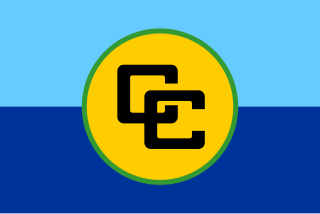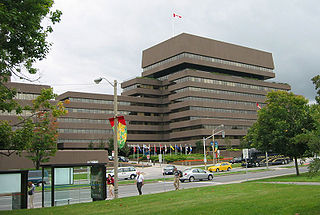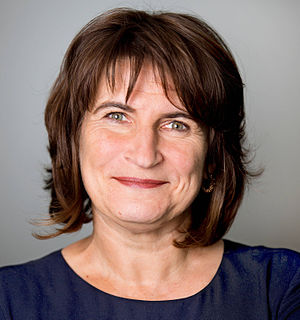Related Research Articles

The Benelux Union, also known as simply Benelux, is a politico-economic union and formal international intergovernmental cooperation of three neighbouring states in western Europe: Belgium, the Netherlands, and Luxembourg. The name Benelux is a portmanteau formed from joining the first few letters of each country's name—Belgium, Netherlands, Luxembourg—and was first used to name the customs agreement that initiated the union. It is now used more generally to refer to the geographic, economic, and cultural grouping of the three countries.
An intergovernmental organization (IGO) or international organization is an organization composed primarily of sovereign states, or of other intergovernmental organizations. IGOs are established by a treaty that acts as a charter creating the group. Treaties are formed when lawful representatives (governments) of several states go through a ratification process, providing the IGO with an international legal personality. Intergovernmental organizations are an important aspect of public international law.

Malawi's former President Bakili Muluzi continued the pro-Western foreign policy established by his predecessor, Hastings Banda. It maintains excellent diplomatic relations with principal Western countries. Malawi's close relations with South Africa throughout the apartheid era strained its relations with other African nations. Following the collapse of apartheid in 1994, Malawi developed, and currently maintains, strong diplomatic relations with all African countries.

The foreign policy of the Netherlands is based on four basic commitments: to the Atlantic cooperation, to European integration, to international development and to international law. While historically the Kingdom of the Netherlands was a neutral state, since 1945 it has become a member of NATO, the United Nations, the European Union and many other international organizations. The Dutch economy is very open and relies on international trade. During and after the 17th century—its Golden Age--the Dutch built up a commercial and colonial empire. It was a leading shipping and naval power and was often at war with England, its main rival. Its main colonial holding was Indonesia, which fought for and achieved independence after 1945. The historical ties inherited from its colonial past still influence the foreign relations of the Netherlands. Foreign trade policy is handled by the European Union. The Dutch have been active in international peacekeeping roles.

The Caribbean Community is an organisation of fifteen states and dependencies throughout the Caribbean having primary objectives to promote economic integration and cooperation among its members, to ensure that the benefits of integration are equitably shared, and to coordinate foreign policy. The organisation was established in 1973. Its major activities involve coordinating economic policies and development planning; devising and instituting special projects for the less-developed countries within its jurisdiction; operating as a regional single market for many of its members ; and handling regional trade disputes. The secretariat headquarters is in Georgetown, Guyana. CARICOM is an official United Nations Observer.

Belgium is a country in Europe and member of major international organizations like the European Union and NATO which are both headquartered in Brussels, Belgium.
A dependent territory, dependent area, or dependency is a territory that does not possess full political independence or sovereignty as a sovereign state, yet remains politically outside the controlling state's integral area.

The foreign relations of Canada are Canada's relations with other governments and peoples. Britain was the chief foreign contact before World War II. Since then Canada's most important relationship, being the largest trading relationship in the world, is with the United States. However, Canadian governments have traditionally maintained active relations with other nations, mostly through multilateral organizations such as the United Nations, the Commonwealth of Nations, La Francophonie, the Organization of American States, and the North Atlantic Treaty Organization (NATO).
In international relations, multilateralism refers to an alliance of multiple countries pursuing a common goal.
Bilateralism is the conduct of political, economic, or cultural relations between two sovereign states. It is in contrast to unilateralism or multilateralism, which is activity by a single state or jointly by multiple states, respectively. When states recognize one another as sovereign states and agree to diplomatic relations, they create a bilateral relationship. States with bilateral ties will exchange diplomatic agents such as ambassadors to facilitate dialogues and cooperations.

Although there has been a large degree of integration between European Union member states, foreign relations is still a largely intergovernmental matter, with the 27 members controlling their own relations to a large degree. However, with the Union holding more weight as a single bloc, there are at times attempts to speak with one voice, notably on trade and energy matters. The High Representative of the Union for Foreign Affairs and Security Policy personifies this role.

The Cook Islands maintains diplomatic relations with various countries and is a member of multilateral organisations. While the country is in free association with New Zealand, which can act on the Cook Islands' "delegated authority [...] to assist the Cooks Islands" in foreign affairs, the Cook Islands nevertheless enters into treaty obligations and otherwise "interacts with the international community as a sovereign and independent state."

The following outline is provided as an overview of and topical guide to Albania:

The following outline is provided as an overview of and topical guide to the Netherlands.

This article deals with the diplomatic affairs, foreign policy and international relations of Barbados.
These are international organizations of which Canada has membership

Elisabeth Maria Josepha "Lilianne" Ploumen is a Dutch politician of the Labour Party (PvdA) and activist. She has been a Member of the House of Representatives since 23 March 2017, Parliamentary leader since 14 January 2021, and Party leader since 18 January 2021.
References
- ↑ "Netherlands". The World Factbook . United States Central Intelligence Agency. July 2, 2009. Retrieved July 23, 2009.